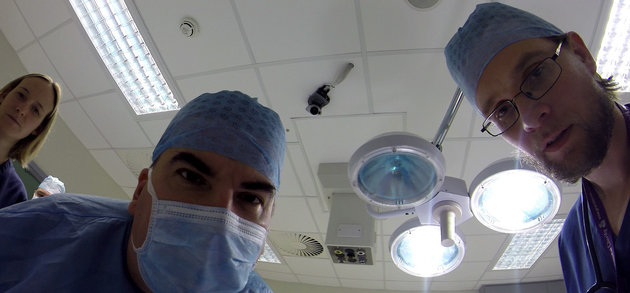Almost a year ago back in April 2015, VRFocus reported on Torbay and South Devon NHS Foundation Trust, which runs Torbay Hospital, becoming one of the first health organisations to use virtual reality (VR) for training purposes with its project PatientVR. Now the project is at an important second stage thanks to the creation of low-cost head-mounted displays (HMDs) like Google Cardboard.
PatientVR has been built around training doctors in understanding how communication, compassion, teamwork, equipment and workspace can effect clinical performance and the quality of experience a patient receives.
To begin with those involved were using an Oculus Rift DK2 headset to view an immersive film created by the Trust. The plan was to invest in a further five headsets enabling six doctors to be trained at any one time. But with Google bringing out its Cardboard HMD which could be used with smartphones the Trust then found it was able to teach entire classrooms and give multiple users their own interactive and immersive VR experience.
“The potential for using virtual reality in healthcare education is enormous, especially in teaching the humanistic skills of compassion and empathy, but to date the prohibitive cost has limited its application,” said Torbay and South Devon NHS Foundation Trust Director of Education, Dr Matt Halkes in a statement.
“However, the introduction of cardboard headsets combined with smartphones now makes it an affordable and scalable option, and has enabled us to realise our ambition of bringing virtual reality into the classroom. This opens up an entirely new field of educational delivery and it is enormously exciting to be at the forefront of its development.”
Since the pilot film the team behind PatientVR a series of 360-degree videos to further the project. They use a camera rig incorporating seven GoPro cameras to give an accurate and immersive look from a patients viewpoint. Project developer Nick Peres said: “We recently used PatientVR for the first time with a whole classroom of clinicians and healthcare staff as an interactive tool to visually highlight potential communication issues in an operating theatre scenario. We found it really encouraged staff to look around the whole 360 degree space and identify those important elements of human factors and humanistic behaviour that happen all around the entire clinical environment, not just directly in front of them.”
VRFocus will continue its coverage of PatientVR as the team further develop the VR training.
-END-
The post UK Hospital Using Google Cardboard in ‘Second Stage’ of VR Training appeared first on VRFocus.















